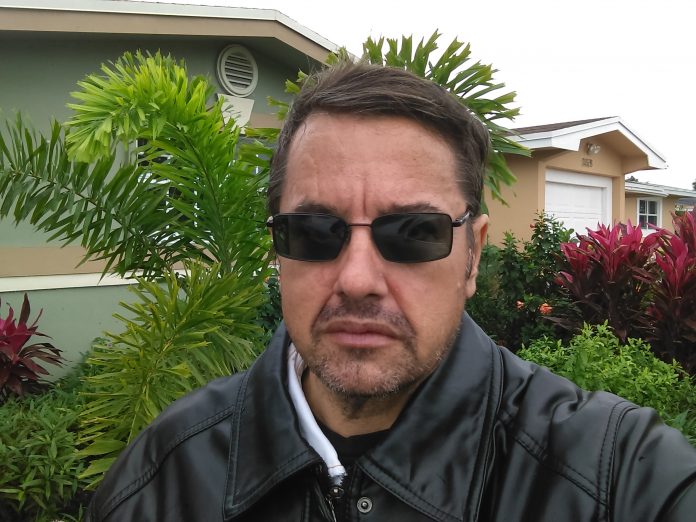Tomato George drove us up toward the mesa in his vegetable truck. He knew of a pond out behind old Ferguson Ranch. I pressed a new box of lures between my knees and stared down at its shiny top. In my pocket, I had a new box of purple Stren line. The old pick-up truck creaked and went faster. A crate of carrots slid down the bed in back and clanked against the tailgate. George looked over at me. “Did you buy stink bait?”
“Nah,” I said.
“Gotta have stink bait if you’re going for catfish. They smell it and get interested. Then they suck it. When you see the line wiggle, you set the hook. Hard…” He spit out the window.
I glanced down at the reel of my fishing pole, wedged between my feet. “No, I wanna get bass,” I said. “Big ones.” I turned the handle on the reel. It made a good loud click.
George popped open a can of Coors with one hand and held the steering wheel with the other. “Can’t fish without beer. It’s the law…” He smiled. “Want one?”
I hesitated. I was flattered by George’s offer. He made me feel like just another one of his friends, even though I was only twelve. But I had worked hard all day, worked a man’s day, unloading vegetables from the van. George was paying me three fifty an hour, so I made twenty-eight bucks, enough to buy a cheap rod, line, and a few lures. “Yeah,” I could use a beer,” I said, and reached for a can. It felt good and cold in my hand. Out loud, I read the metallic print: “Brewed with pure Rocky Mountain spring water.”
“Kerz,” said George.
“What?”
“Call it Kerz. Then you’re cool.”
“Kerz,” I repeated. “Yeah, I drink Kerz!” We laughed, just as the pick-up hit a big pot-hole, shuddered, bounced, and spilled beer on both of us.
“Right on!” said George. He turned onto a muddy road and drove up a hill. Then we almost drove into the pond. George said, “We’re here,” and slammed on the brakes.
It was a small pond, only about a hundred fifty feet across. Scrub oak and tall reeds surrounded the pond on three sides. On the open side stood a small dock with peeling gray paint. I pressed open the door handle and jumped out of the cab, grabbing my gear. George swung out and pulled a bottle of “Sir Edwards” Scotch from under the front seat. He showed me how to tie the line on my reel and thread it past the bail arm. “Time to fish!” I yelled.
“Quiet now,” George said softly, “or you’ll scare ‘em.”
“I know,” I said. “I’ve fished a lot before.”
“Oh,” George smiled. He went to get a pole out of his toolbox.
We moved over to the dock. George had a plastic container of worms. He dug one out and it wiggled between his fingers. Then he wrapped it around his hook, wound it double and pierced it twice, so it made a twitching bundle. I didn’t like worms; I didn’t like the way they squirmed. I picked out a bright red lure instead and tied it to my line.
George cast out first, a long smooth cast that flew directly to the center of the pond and dropped in place. The water barely even rippled. “Nice one,” I said. Holding the rod low behind my shoulder, I tried to imitate his cast. I swung the rod forward and stepped into the throw, just like George did. But my line got caught on a tree overhead. I squinted, peered up into the leaves, and saw the line tangled on a small branch. A bird hopped over, fluttered its wings, cocked its head, and pecked at the red lure. “Dammit,” I said. It felt good to curse.
“Don’t get upset now,” George said in steady voice. “You’ll probably have to go and cut the line. No point in messing around with that tree.”
He was right. A quick slash with my penknife, and the problem was solved. I tied on another lure. This one was orange with gold fringe.
“There you go…” George opened the Scotch sipped at it out of the bottle while I got ready to cast again. “Not so fast this time,” he said. “Follow through with your whole arm.”
But the cast landed in the brush on my left. Didn’t even make it to the water. I jerked the pole hard. The lure was stuck tight. So I whipped out my pocket knife again.
“Wait a sec,” said George. “How many lures do you have left?”
“One.”
“Better go find it. Otherwise you’ll soon be using worms…” He smiled. He knew I didn’t like those worms.
I turned so he couldn’t see me blush and headed toward the bushes. They crackled as I pressed in deeper. The reeds were thick. My arm got scratched and I heard some bees. Then I spotted the line snaking through a puddle, and there—the lure was caught between two rocks. I stepped forward and my shin bumped against something hard, something buried in the thicket. With both hands, I tugged at the weeds, pulled back dried grass and mud vines. It was a canoe!
“George! George! I found a canoe!” I yelled.
He didn’t answer. He must have gone to the truck for beer. Then I realized it was stupid to shout. Might have scared all the fish away. I worked hard, digging and kicking at reeds to expose the rest of the canoe. I dragged it out. It was a good canoe. A little battered maybe, but it looked like it would float. There was even a paddle. I couldn’t wait to put the canoe in the water. This would be my boat, my bass boat. I’d use it to fish the bluff. That’s where all the big fish hid. I dragged the canoe over to the dock.
George was still out by the truck. I could hear him singing. But I didn’t call to him. I pushed the boat into the water and watched the way it floated. No leaks. I smiled, smoothed back my hair—the canoe started to drift away! I lunged for it, and missed. Luckily, I still held the paddle in my hand. So I thrust fast and secured the canoe until I could grab it again. Then, holding my rod in one hand, I climbed aboard.
The canoe swayed a lot, but I centered my weight in the middle to steady it. I took a few strokes and glided from shore. Just to get the feel of the canoe, I paddled it around a little. “She’s made solid,” I said under my breath. Then I thought about the way I called the boat a “she,” like a captain would… I knew my father wouldn’t want me out in a boat without a life preserver. He didn’t even like fishing. But George and I had finished work early for the first time, and we were celebrating.
When I was ready to cast, I swung the lure towards the reeds. It plopped in just where I wanted. I let it sink a bit, then bobbed the tip of the fishing pole. This made it seem like the lure was swimming through the water. The fish would be attracted by the motion and go to bite. Suddenly, I got a huge hit—the line went taught and my pole bent almost double. Then the line went slack again. “He spat it out,” I said quietly. But I kept bobbing the pole, concentrating. I set the drag just in case the fish was still there, waiting to take the lure and run with it. Then I felt him again, stronger this time. The reel screeched and vibrated as he took the lure and swam toward the deep water. I wound in some, and then I had him firm.
But this fish was smart. When he couldn’t run any more, he headed back to the reeds where the line would tangle and break. I jerked the spindle round as fast as I could and reeled in more line. This was a big fish. He was actually towing me, boat and all, toward the reeds. “Oh, no you don’t, fish…” I said, and held the pole tight. My fingers were numb.
I heard George shouting and, out of the corner of my eye, saw him jumping up and down on the dock. But I had to concentrate. I tightened the drag all the way and wound in line. I was gaining on him. Then I saw the fish for the first time, close to the surface, swimming like hell. He was big all right, about two feet. The sun gleamed on his back as he surged through the water. He had tan and gold marks on his sides, and silver fins. I took a deep breath. He was beautiful. There was still time—I felt the bulge of the pocket knife in my back pocket. I could cut the line and set him free… No. I was a fisherman. A fisherman always keeps his catch. I jerked the rod up in a quick yank, and then reeled faster.
“Go for it!” George yelled. He was pulling at his hair. Now there were only a few feet of line between me and the fish. I could tell he was a bass, a great big bass. With two hands on the rod, I tried to lift him out of the water. The pole bent in half, almost in a circle, so I grabbed the wet line and lifted out the fish. The line dug into my palms, but didn’t break. Stren was supposed to be extra strong. That’s what George had said. The hook and lure were deep inside the fish. I couldn’t even see them. I only saw the bright arching of the bass as he emerged from the water and fought me from the air.
I set the fish in the bottom of the boat and held him down with both feet. His stomach was fat. In the middle of it, there was a weird, round golf-ball size bulge. His fins flapped like little wings and bubbles came out of his gills. He flopped around for a while, then lay still.
As I paddled to shore, George was whooping and cheering on the dock. His eyes were red from drinking. He ran to get a bucket, then helped steady the canoe and reached for my fish. “Well, damn,” that’s the biggest bass I’ve ever seen… Must weigh twenty pounds. You got the granddaddy of ‘em all!” He beamed at me, took out a pair of needle-nosed pliers from his pocket and stuck it down the fish’s throat. He tugged at the hook, then worked it side to side. I winced. The bass shuddered and gagged. Blood dripped down George’s hand.
“What’s that round thing on his stomach?”
George pressed it with his thumb. “Feels kind of hard. Maybe he ate a lure… Or maybe he ate a turtle. Big fish like this gets mighty hungry.”
I looked down at the canoe and the oblong, damp spot in the bottom where the fish had lain. George got a bucket and went down to the pond to fill it with water for the fish. “You better put that canoe back where you found it,” he said.
On the way home, I couldn’t stop thinking about the fish. George had put him in the back so he wouldn’t smell up the truck, but I could see him through the rear window. I could see his eyes. George had said the bass was a granddaddy. He had probably spawned a lot of babies and probably got hooked a lot, but escaped. And survived. That’s how he knew to head for the reeds. But I had caught him, and taken him with skill. I stole another glance through the window. Next to George’s boxes of tomatoes—the over-ripe ones that we couldn’t sell in the parking lot at Tastee Freeze—the bass seemed greener than before. He was almost vertical in the bucket. His head stuck out a bit. His mouth kept opening and closing.
George couldn’t stop talking about the fish. “Yeah, he’s a biggie all right. He’ll be good eatin’ no doubt. And you landed him like a pro. Let’s stop at the store and show him off to all the folks.”
It took a second for this to sink in. George wanted to go exhibit the fish. To measure him and stick his finger in its bloody throat. But I didn’t want to parade him around. I didn’t want anyone to see him.
“No,” I said.
“No, what?”
“Let’s not take him to the store.”
George looked puzzled for a moment. Then he said, “Oh, I get it. You want to go show him to your old man right away. Okee dokee.”
We pulled into my driveway. George ran out to look at the fish again. I wiped some slime from my hand onto my pants. I was glad that my father wasn’t home.
“He’s still alive! Still alive!” George announced. He was giggling. “You’ll have to hit him with something so he dies. Do you got any beer?”
“Can you take care of him for me, George?” I asked. My stomach hurt.
George looked at me for a moment and laughed. “Sure, buddy. Go get me a rock.”
My legs were stiff, aching. I forced them to move, consciously lifted each thigh, swung forth each foot and set it back down. Obediently, I went to look for a rock. I found one near the dumpster and gave it to George. Then I closed my eyes. With three heavy thuds, he hammered the fish.
“He won’t die. He’s tough,” George reported. “Go get me some tin foil.”
He wrapped up the bloody bludgeoned bass, then handed him to me. I didn’t want to hold him. I didn’t want to touch the fish anymore, but I couldn’t refuse now. I took him in two arms. He was very heavy. I felt him move inside the foil.
“Go put him in the freezer,” said George.
My hands burned. I carried the fish to the storage freezer in the garage. I opened the door and gently lay him on the bottom shelf. Then I closed the door.
The rattling sound of my father’s Volkswagen diesel sounded in the driveway. I watched George walk over to the car and begin talking excitedly, even before my father got out. George grinned and spread his hands wide, demonstrating the length of the bass. Then he made fist and beat it against his palm. Through the open car window, I could see my father nodding slowly, but he didn’t look anywhere near as excited as George.
I walked outside to the car. My father stepped out. He leaned against the fender and adjusted his glasses on the bridge of his nose. His expression was curiously blank. “Heard you caught a big bass,” he said.
“Yeah.”
“You should have told me you were going up to the mesa…” He stared at me. “We can’t eat that bass.”
“What?” I said.
George looked shocked. “Why not?”
“They used to farm a lot up there. Back before the EPA. Those ponds are full of DDT and mercury. You can’t eat those fish. They’re sick. They could cause cancer.”
A wave of nausea gripped my body. I swallowed, blinked and managed to stay calm. I wiped my hands on my pants again. “What should we do with it?”
My father didn’t answer. His jaw tensed.
“Throw it in the garden,” said George. “The birds will eat him. They’ll be happy.”
“No. It could poison the birds, too,” said my father. “You should have told me you were going up there.”
I felt numb. A hot flash ran up my neck. “So what can we do? He can’t swim anymore.” “Is he still in the freezer?” my father asked.
I nodded.
“Wait until he’s dead. The freezer will put him to sleep…” He closed his eyes. He was silent for a long while.
“Then what?” I asked
“Build a fire back where we burn brush. Wait till the flames are least three feet, and put the fish in the fire. Stay and watch till all the flesh and scales are burned off, and make sure no animals get any of it.”
I stared at the ground.
“Wait until only bones are left.” My father’s eyes narrowed. He took off his glasses, then wiped his brow. “And one more thing…”
“What?”
“Tell the fish you’re sorry.”
(This story originally appeared in The Westchester Review, Volume 9)















